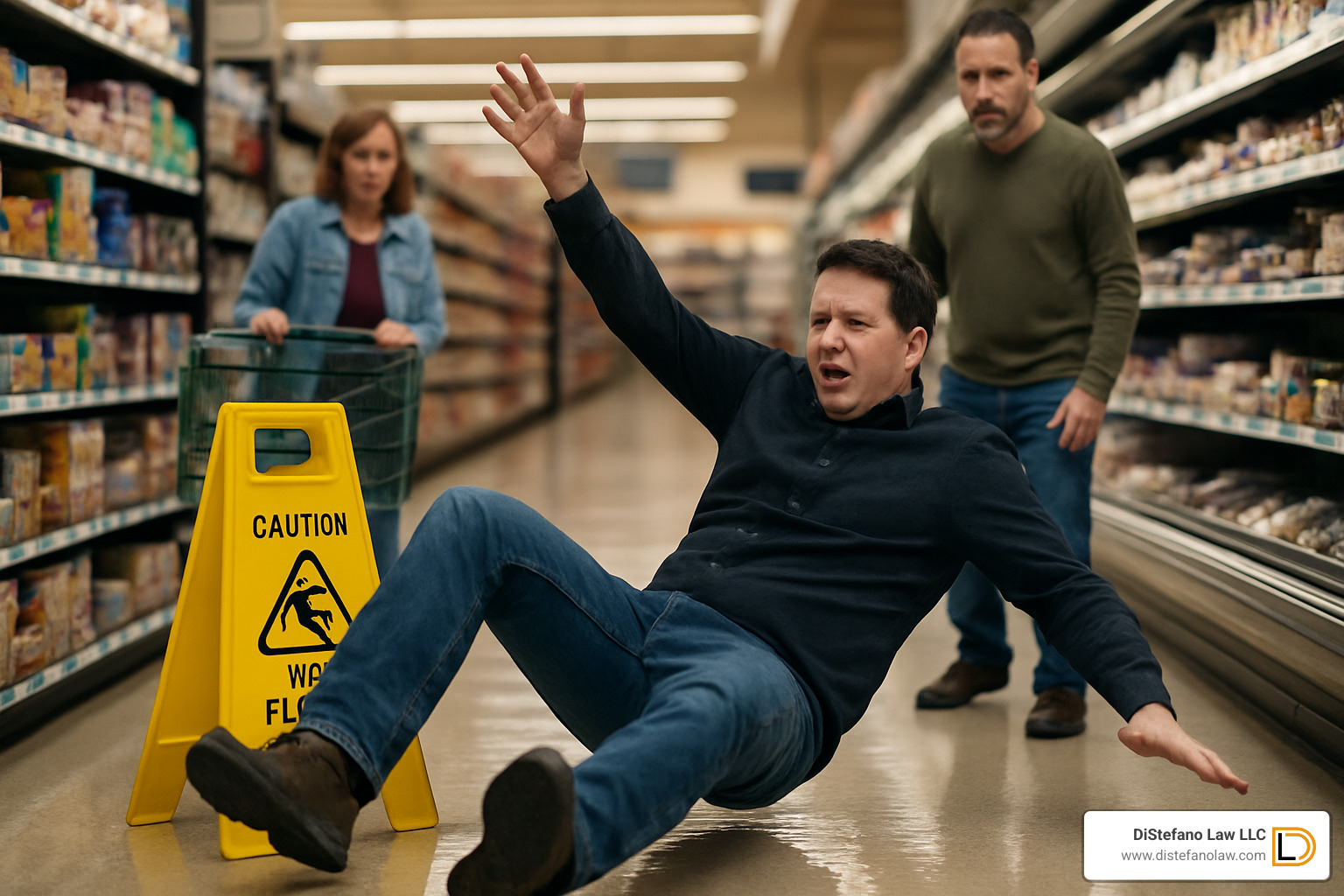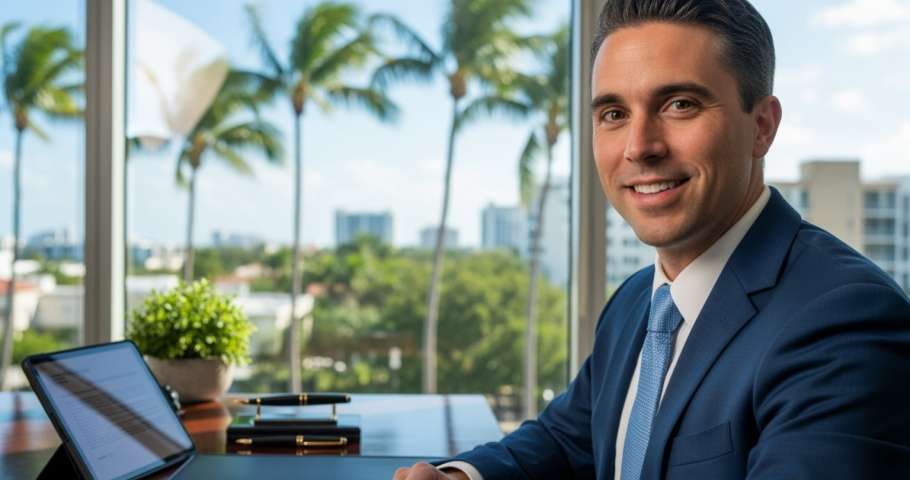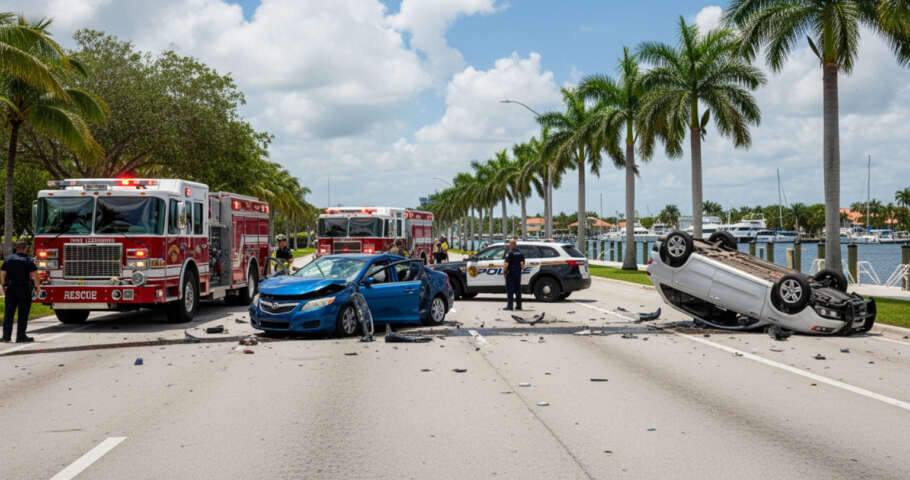Understanding Your Rights After a Slip and Fall Accident
Slip and fall compensation can range from $10,000 for minor injuries to over $1 million for severe cases, but the amount you receive depends on factors like injury severity, medical expenses, lost wages, and the property owner’s level of fault.
Quick Answer – What You Can Recover:
- Medical expenses – Past and future treatment costs
- Lost wages – Income missed due to injury
- Pain and suffering – Typically 1.5-5x your medical bills
- Future care costs – Ongoing treatment needs
- Loss of earning capacity – Reduced ability to work
- Property damage – Damaged personal items
Over one million Americans slip and fall each year, resulting in emergency room visits and unexpected financial burdens. In Florida, you have four years to file a slip and fall claim, but acting quickly strengthens your case.
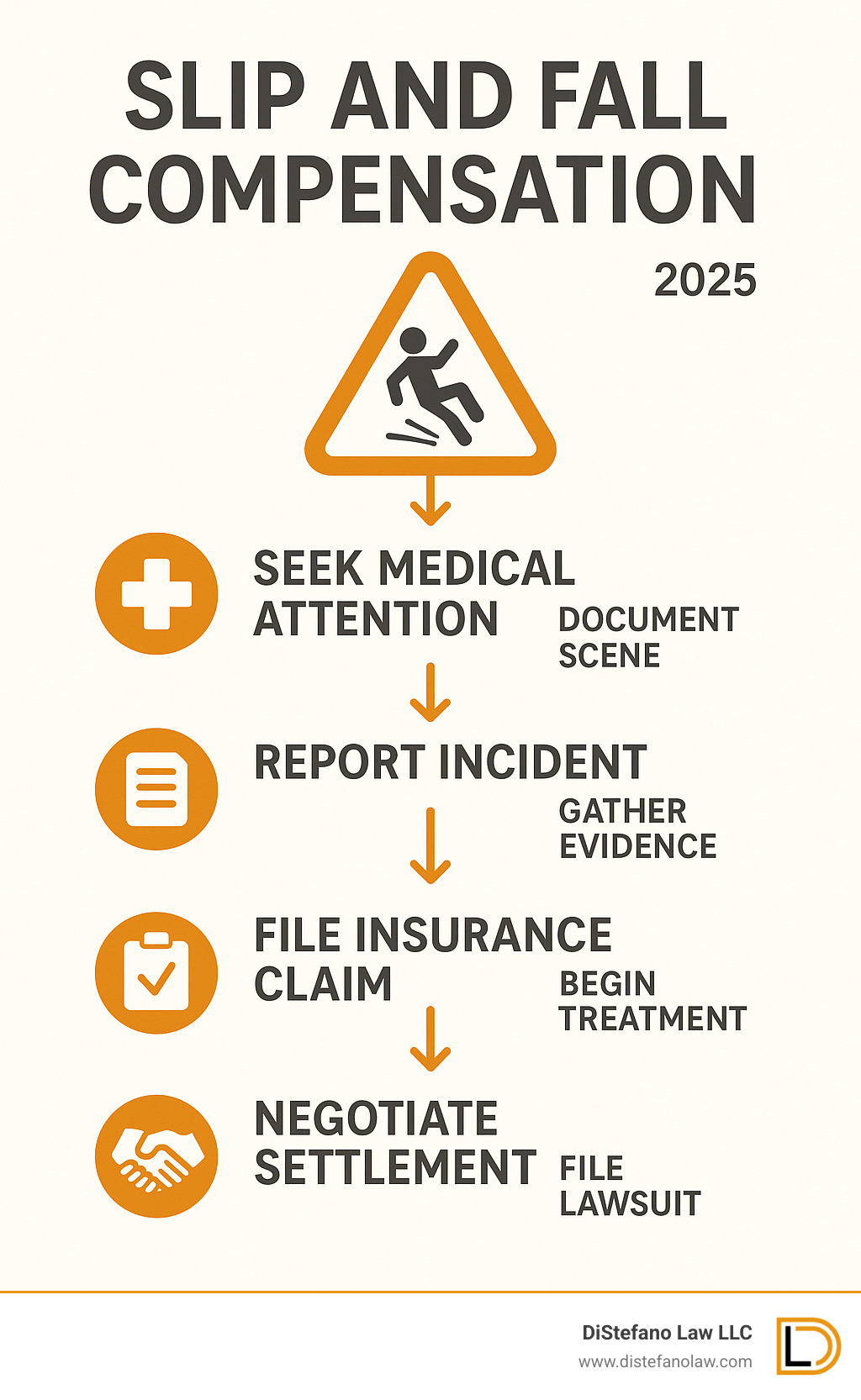
Important Slip and fall compensation terms:
Why This Guide Matters
As personal injury attorneys with over 40 years of experience in Fort Lauderdale and throughout South Florida, we’ve seen how slip and fall accidents can devastate families financially. Slip and fall compensation claims fall under premises liability law, which holds property owners accountable when dangerous conditions cause injuries.
Understanding a Slip and Fall Claim
A slip and fall claim holds property owners accountable when their carelessness causes you to get hurt. Slip and fall compensation claims fall under premises liability law – property owners have a responsibility to keep visitors reasonably safe.
The Occupiers’ Liability Act In British Columbia states that property occupiers must take reasonable care to see that visitors are reasonably safe. While this is Canadian law, many U.S. courts follow similar principles.
What You Need to Prove
To win your case, you’ll need to show four key things: the property owner owed you a duty to keep things safe, they broke that duty by letting a dangerous condition exist, their carelessness directly caused your fall and injuries, and you suffered real damages like medical bills or lost wages.
Your Status on the Property Makes a Difference
The law treats different visitors differently. Customers or business visitors (invitees) are owed the highest level of protection. Social guests get somewhat less protection. Trespassers get minimal protection, though there are special rules when children are involved.
Common Dangers That Cause Falls
Wet or slippery floors, uneven surfaces like torn carpeting, poor lighting in stairwells, ice and snow, debris or obstacles in walkways, and missing handrails or broken steps are the most common hazards.
How Fault Gets Divided in Florida
Florida follows pure comparative negligence – even if you were partly at fault, you can still recover compensation. Your award gets reduced by your percentage of fault. If you were 30% at fault and the store was 70% at fault, your $100,000 settlement becomes $70,000.
Who Can Be Held Liable?
Property owners bear the main responsibility, but tenants and businesses that lease space often become responsible for hazards they create. Maintenance contractors can be liable when their work creates dangers. Municipalities are responsible for public sidewalks and government buildings, but suing the government comes with special rules and strict notice requirements.
The smart approach is identifying all potentially responsible parties early in the process, as each party may have separate insurance policies that can contribute to your slip and fall compensation.
What To Do Immediately After a Fall
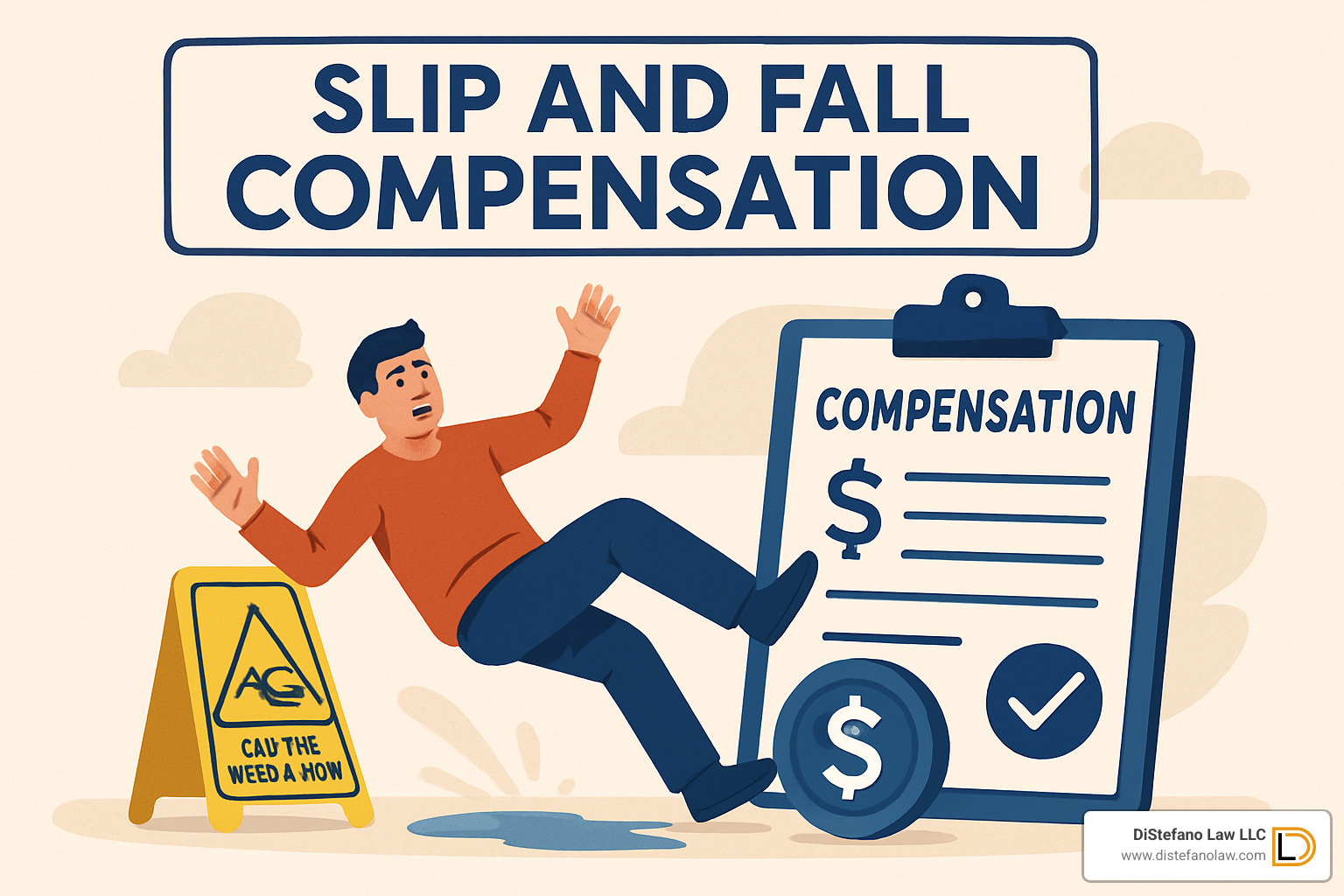
The moments after a slip and fall directly impact your ability to recover fair slip and fall compensation. Seek medical attention first, even if you think you’re fine – adrenaline often masks serious injuries.
Document the scene while you’re still there. Use your smartphone to photograph the exact spot where you fell, the hazard that caused your accident, your injuries, your footwear, and any warning signs or lack thereof.
Get the incident report by notifying the property owner immediately and requesting a copy. Preserve your footwear and clothing as evidence.
Step-by-Step Action List
First 24 hours: Seek medical attention, take photographs, write down everything you remember, collect witness contact information.
First week: Follow up with your primary care physician, keep all medical records and bills, document missed work, avoid social media posts about your accident.
Within 30 days: Consult with a personal injury attorney, file insurance claims, continue prescribed medical treatment, keep a daily pain diary.
Critical deadlines: While Florida gives you four years to file a lawsuit, municipal property claims typically require written notice within 60 days. Some jurisdictions have even stricter rules.
For detailed information about Florida’s requirements, visit our guide on slip and falls.
Mistakes That Shrink Your Slip and Fall Compensation
Delaying medical treatment gives insurance companies ammunition to argue your injuries aren’t serious. Property owners frequently fix hazards immediately after accidents, destroying evidence – this is why immediate photographs are critical.
Social media posts can devastate your claim, as insurance investigators routinely check platforms for contradictory evidence. Quick settlement offers within days of your accident rarely account for ongoing medical needs or future complications.
Building a Strong Compensation Case
Building a winning slip and fall compensation case requires comprehensive evidence that tells your story clearly.
Scene Documentation includes professional accident reconstruction analysis of floor surfaces, lighting levels, and building code violations. Maintenance Records can show property owners knew about hazards or failed to follow proper safety procedures. CCTV Footage provides powerful evidence but disappears quickly – many systems delete footage after 30-90 days.
Expert Testimony from medical experts connects your fall to your injuries, while safety experts identify where property owners failed to meet industry standards.
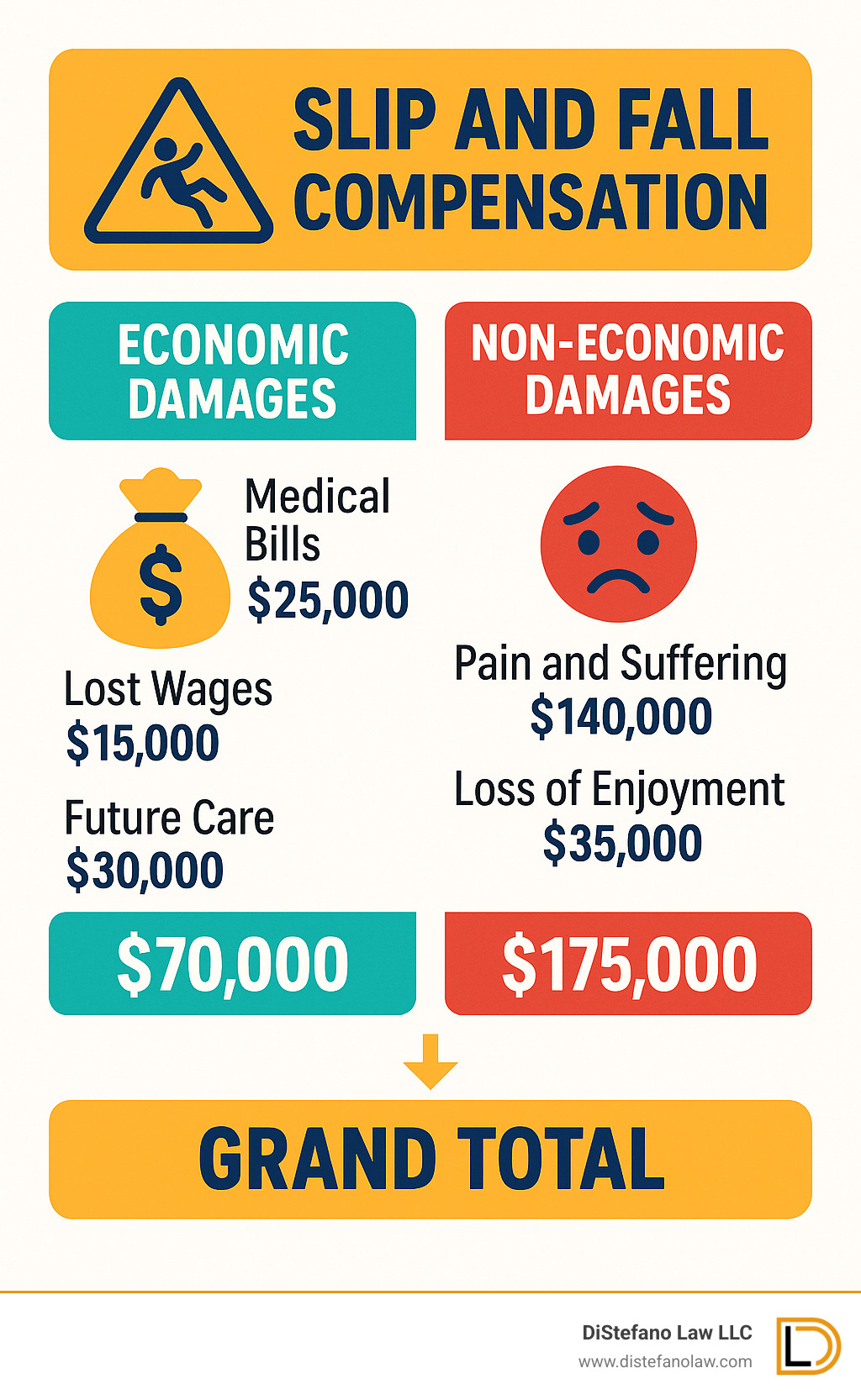
Understanding Your Damages
Economic damages include medical bills, future medical expenses, lost wages, overtime opportunities, and household services you can’t perform.
Non-economic damages compensate for pain, anxiety, lost confidence, and depression after your independence is affected.
Pain and Suffering calculations use multiplier methods, typically 1.5 to 5 times your economic damages. Minor injuries might get a 1.5 multiplier, while permanent disability could justify 5x.
Evidence the Insurer Can’t Ignore
Medical Documentation needs to create a clear timeline from your fall to current condition. Emergency room reports document injuries immediately, diagnostic imaging provides objective proof, and specialist consultations add credibility.
Employment Records including pay stubs, tax returns, and employer statements prove your financial losses. For detailed medical evidence information, review scientific research on muscle sprains and tendon strains.
Defenses & Contributory Negligence
Property owners commonly use the “Open and Obvious” Defense, claiming reasonable people would have seen and avoided the hazard. They also claim Reasonable Inspection, producing cleaning schedules to show they were being responsible.
Comparative fault arguments blame you for not watching where you walked, wearing inappropriate footwear, being distracted, ignoring warning signs, or being impaired. In Florida’s pure comparative negligence system, even partial fault doesn’t eliminate your recovery – it just reduces your compensation proportionally.
Calculating Slip and Fall Compensation
Understanding how slip and fall compensation is calculated helps set realistic expectations. The basic formula: out-of-pocket expenses plus pain and suffering (typically 1.5 to 5 times medical costs) equals total compensation.
Insurance policy limits often become the ceiling for recovery. Small businesses might carry $300,000 coverage, while major retailers typically have $1-5 million policies. Punitive damages are extremely rare, requiring proof of intentional misconduct or gross negligence.
Settlement ranges: Minor soft-tissue injuries typically settle between $10,000-$50,000, moderate injuries requiring surgery often reach $50,000-$250,000, and severe injuries with permanent disability can exceed $1 million.
For detailed guidance on maximizing recovery, visit our Florida premises liability attorney page.
Slip and Fall Compensation Scenarios
Sarah’s grocery store slip – sprained ankle, $4,500 medical costs, $1,000 lost wages, 3x multiplier for pain and suffering = $22,000 settlement.
John’s apartment complex fall – broken wrist requiring surgery, $31,000 medical bills, $12,000 lost wages, 4x multiplier due to permanent limited mobility = $215,000 settlement.
Maria’s traumatic brain injury – $125,000 immediate medical care, $200,000 future medical needs, $300,000 lost earning capacity, $500,000 pain and suffering = $1,125,000 settlement.
How Comparative Fault Impacts Slip and Fall Compensation
Florida allows recovery regardless of fault percentage. If your damages equal $100,000 but you’re 30% at fault, your recovery becomes $70,000. Other states bar recovery at 50% or 51% fault, but Florida has no such limitation.
Insurance companies will always try to shift blame to minimize payouts. Our job is protecting your rights and ensuring fair slip and fall compensation that reflects the true cause of your injuries.
Navigating the Legal Process in Florida
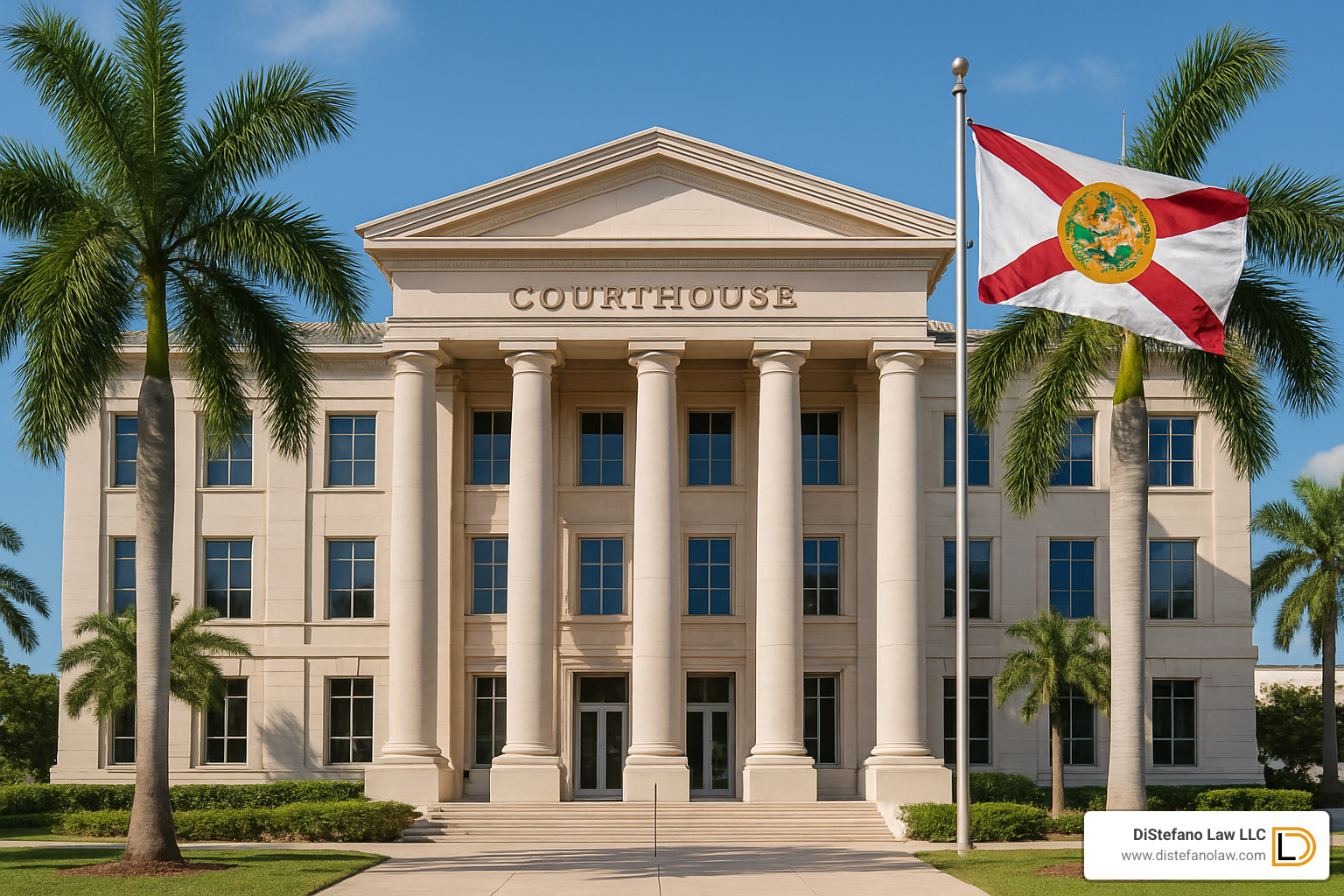
Florida’s statute of limitations gives you four years to file a lawsuit for slip and fall compensation claims. However, insurance companies want notice within 30-60 days, and government entities may require even faster action.
Most cases follow this path: insurance claim filing, investigation, negotiation, and potentially mediation. Less than 5% of slip and fall cases go to trial – most settle within 12 months.
Contingency fees make legal representation accessible. You won’t pay attorney fees unless we recover compensation. Standard fees range from 33% to 40% of your settlement.
Do You Need a Lawyer?
Complex liability situations with multiple responsible parties require legal expertise. Severe injuries with permanent disability demand experienced representation. Insurance company pushback through denials or unreasonably low offers signals you need professional help.
At DiStefano Law LLC, we’ve spent over 40 years helping slip and fall victims throughout Fort Lauderdale, Lauderhill, Wilton Manors, Sunrise, and South Florida. For more information, visit our personal injury law firm Fort Lauderdale page.
Special Rules for Government Property
Slip and fall accidents on government property have special notice requirements and damage limitations. Written notice to the government entity is usually required within 60 days, including specific details about when, where, what caused the accident, your injuries, and witnesses.
Sovereign immunity caps limit recovery to $200,000 per person or $300,000 per incident in Florida, unless the legislature approves higher amounts. These strict deadlines and procedures make experienced legal guidance essential for government property cases.
Frequently Asked Questions about Slip and Fall Compensation
How long do I have to file my claim in Florida?
You have four years from your accident date to file a lawsuit in Florida. However, insurance companies want notice within 30 to 60 days, and government property falls require written notice within 60 days. Workers’ compensation claims have 30-day reporting deadlines. Don’t wait – getting legal advice early protects your rights and ensures fair slip and fall compensation.
What evidence carries the most weight with insurers?
Medical records that clearly link injuries to your fall are crucial. Photographs taken immediately after your accident show conditions before repairs. Witness statements from independent observers carry enormous weight. Video surveillance footage removes all doubt about how accidents occurred. Incident reports create official records, and maintenance records can prove property owners knew about dangerous conditions but failed to act.
Can I still recover if I was partly at fault?
Absolutely. Florida follows “pure comparative negligence” – your compensation gets reduced by your fault percentage, but you’re not completely barred unless 100% responsible. If you’re 30% at fault and total damages are $100,000, you’d recover $70,000. Even at 60% fault, you could still recover 40% of damages. Insurance companies will try to shift blame, but experienced attorneys know how to minimize your fault percentage and maximize the property owner’s responsibility.
Conclusion
Getting slip and fall compensation isn’t just about filing paperwork and hoping for the best. It’s about understanding your rights, acting quickly, and having someone in your corner who knows how to fight for what you deserve.
We’ve walked you through the entire process—from those crucial first moments after your fall to building a strong case that insurance companies can’t ignore. The key takeaways are simple: seek medical attention immediately, document everything you can, and don’t try to handle complex legal issues alone.
At DiStefano Law LLC, we’ve seen too many people accept lowball settlements or miss important deadlines because they didn’t know their rights. That’s exactly why we’ve spent over 40 years helping slip and fall victims throughout Fort Lauderdale, Lauderhill, Wilton Manors, Sunrise, and all of South Florida get the compensation they deserve.
Here’s what makes us different: We don’t treat you like just another case number. We take time to understand how your injuries have changed your daily life, affected your work, and impacted your family. Every case gets our personal attention because we know that behind every claim is a real person dealing with real challenges.
We handle the heavy lifting—investigating your accident, dealing with insurance adjusters, gathering medical records, and negotiating settlements. You focus on getting better. We work on a contingency fee basis, which means you pay nothing unless we win your case.
Your slip and fall compensation should cover everything—your medical bills, lost paychecks, future care needs, and the pain you’ve endured. Insurance companies know most people don’t understand the true value of their claims. We do, and we’re not afraid to fight for every dollar you’re owed.
Don’t let time slip away while you’re wondering what to do next. Florida’s deadlines are real, and evidence disappears quickly. Your free consultation gives you answers without any commitment or cost.
Contact Us today and let’s talk about your case. You’ll speak directly with experienced attorneys who care about your outcome as much as you do. It’s time to level the playing field and get the slip and fall compensation that helps you move forward with confidence.


